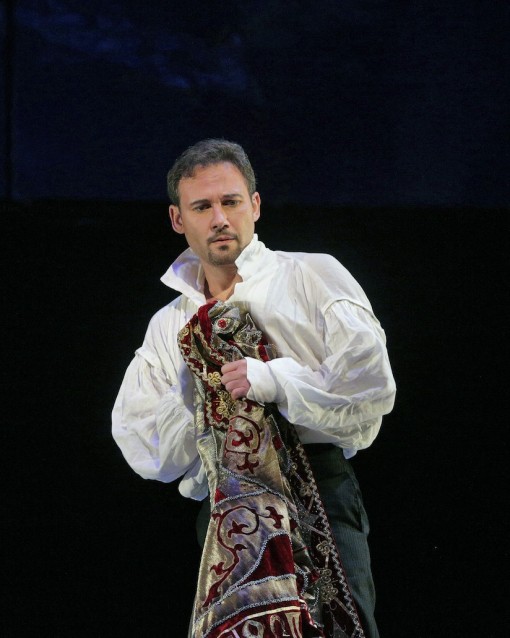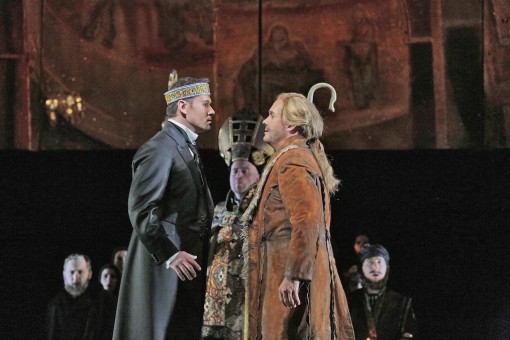Szymanowski’s elusive “King Roger” receives thoughtful advocacy in Santa Fe

Mariusz Kwiecien stars in Szymanowski's "King Roger" at Santa Fe Opera. Photo: Ken Howard
With back to back rarities, if was time for yet another company premiere Friday night at Santa Fe Opera.
Thursday’s performance of Rossini’s Maometto II was hard to beat—presented in a new critical edition, with extraordinary vocalism by soprano Leah Crocetto and accompanied by a violent, remarkably well timed thunderstorm.
On Friday, Santa Fe Opera presented the company debut of Karol Szymanowski’s King Roger. And, if not quite as much of an event, a fine cast and thoughtful production made as worthy a case as we’re likely to get for this intriguing yet elusive work.
The Polish composer’s 1924 opera is a work out of its time. The scenario concerns King Roger whose peaceful Sicilian realm is upended by the arrival of a mysterious Shepherd who preaches a spiritual doctrine of personal freedom. Roger is attracted to the young man and intrigued by his philosophy, but his ministers advise the king to kill the Shepherd, who they view as a threat to the community’s Christian faith and social order.
As it turns out, they’re quite right, for the kingdom’s people are soon bewitched and become the Shepherd’s followers, including Roger’s wife, Roxana. The king is angered by the citizens’ excitement and anguished by his own intensely conflicted feelings about the young man. Enticed by Roxana, Roger take part in the Shepherd’s Dionysian revels but ultimately decides not to join Roxana in following him, returning alone to his kingdom, a new leader, changed and purified.
King Roger is a strange, fascinating work. Cast in a compact, unbroken eighty minutes, the music embodies Szymanowski’s style of restless, surging music and exotic coloring, familiar from the composer’s violin concertos and symphonies. The slender storyline serves as a framework for the stark opposing forces embodied in Roger’s conflicted soul: a cool Apollonian philosophy vs. Dionysian sensuality, a repressed Europe versus the more exotic and vital East and, the struggle for honesty in one’s own desires, as reflected in the closeted composer’s treatment of Roger’s fearful repression of his attraction to the Shepherd.
Yet despite Szymanowski’s sensual music, King Roger is one of those operas that are better heard listening at home than in the theater. The scenario is nebulous and ephemeral, lacking effective dramatic incident and theatrical spark to the extent that the work seems more a mystical orchestral meditation with added singers, chorus and scenery than a finished and successful work of theater.
Thomas Lynch’s Minimalist production worked effectively enough, especially the opening scene with the large chorus of faithful slowly filing into a church to worship under a large golden panel that suggested equal parts Gustav Klimt and coptic iconography. I’m not sure the unvaried bare, sleek style worked as well in the latter scenes when a more arboreal sense of the forest revels would have provided greater visual contrast and underlined the tension between the two worlds. Stephen Wadsworth’s direction handles the difficult action and symbolism with a fluent blend of natural and stylized movements, not overplaying the gay subtext too heavy-handedly.
Mariusz Kwiecien proved perfect casting as Roger. The Polish baritone’s lean, aristocratic bearing and dark, firmly focused voice skillfully painted the anguish of the king, compelled by the shepherd’s religion yet fearful of letting loose his desires.
Erin Morley’s high soprano was a bit underpowered against Szymanowski’s surging orchestral textures but she brought an airy, haunting expression to Roxana’s Lament.
A younger, more boyish singer might have served the role of the Shepherd better dramatically, but William Burden’s plangent, flexible tenor put across the music vocally with the right mystery and enticement. Raymond Aceto was a worthy Archbishop, Dennis Petersen a somewhat raw-voiced Edrisi.
Chorus master Susanne Sheston did her best work of the summer in this opera, drawing powerful echt-Slavic choral singing in the church service and polished and expressive ensemble work in the latter scenes.
Evan Rogister conducted the shifting, restless score with great skill, drawing luminous, kaleidoscopic playing from the remarkably versatile Santa Fe orchestra.
There are two more performances of King Roger on August 9 and 14. santafeopera.org

Marius Kwiechen as Roger and William Burden as the Shepherd in "King Roger." Photo: Ken Howard
Posted Aug 11, 2012 at 1:55 pm by FMarek
“Yet despite Szymanowski’s sensual music, King Roger is one of those operas that are better heard listening at home than in the theater.”. You clearly didn’t witness the incredible production in Paris a opulent years back or you’d never consider making such a wrongheaded statement. The Santa Fe production was tepid, that’s the directors fault not the opera itself. I am sure there are many clips on YouTube whereby you can get a flavor of this magnificent piece done correctly.